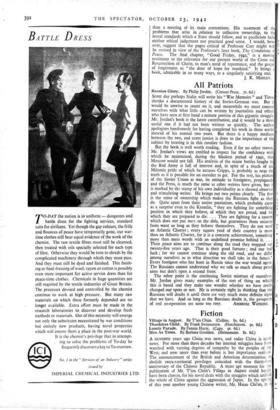All Patriots
Russian Glory. By Philip Jordan. (Cresset Press. 7s. 6d.) SOME day perhaps Stalin will write his " War Memoirs " and Times shenko a documented history of the Soviet-German war. But it would be unwise to count on it, and meanwhile we must content ourselves with what little can be written by journalists and others who have seen at first hand a minute portion of this gigantic struggle. Mr. Jordan's book is the latest contribution, and it would be a more useful one if it had not been written so quickly. The author apologises handsomely for having completed his work in three weeks instead of his normal two years. But there is a happy medium between the two, and scant justice is done to the importance of the subject by treating it in this cavalier fashion.
But the book is well worth reading. Even if for no other reason, Mr. Jordan's views are entitled to respect for the confidence with
which he maintained, during the blackest period of 1941, that Moscow would not fall. His analysis of the major battles fought by the Red Army is full of interest and, in spite of a touch of the Miltonic pride of which he accuses Cripps, is probably as near the truth as it is possible for an outsider to get. For the rest, his picture of the Soviet Union at war, its attitude to foreigners, propaganda and the Press, is much the same as other writers have given, but it is marked by the stamp of his own individuality as a shrewd Observer and stimulating writer. He brings out two points clearly. The first is the sense of ownership which makes the Russians fight as they do. Quite apart from their native patriotism, which probably came as a surprise even to the Kremlin, " they are fighting for something positive in which they believe, of which they are proud, and for which they are prepared to die. . . . They are fighting for a system which does not put mei on the dole, but guarantees them security from want so long as they behave themselves. They do not need an Atlantic Charter ; every square yard of their country is more than an Atlantic Charter, for it is a concrete achievement, something more than mere words with an undefined promise behind it. . . . Their peace aims are to continue along the road they mapped out twenty-five years ago. That is their good fortune ; and our bad luck ; for we cannot continue along the old road, and we differ among ourselves as to what direction we shall take in the future." Every foreigner who has been in Russia since the war would agree. The Russians cannot understand why we talk so much about peace aims but don't open a second front.
The other point is the continuing Soviet mistrust of ourselves. Mr. Jordan gives many examples of the sort of thing on which this is based and they make one wonder whether we have really changed our spots or not. He is certainly right in thinking that the Russians will doubt it until there are very much more definite signs that we have. And so long as the Russians doubt it, the prospects
22'
2,
22!
of real co-operation are none too rosy. AMBROSE WATKINS.


























 Previous page
Previous page